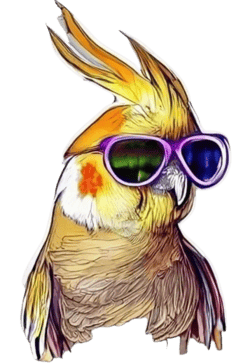Are Bananas Good for Cockatiels? Unveiling the Hidden Truth
A pet cockatiel can make a delightful addition to your home. With their vibrant personalities and memorable tunes, these feathered friends are filled with enchanting surprises. But let’s be honest, when it comes to a proper diet for them, a lot of us are left unsure, especially when it comes to human foods like fruits, say bananas. So, let’s look at the banana-cockatiel debate in detail.
Understanding a Cockatiel’s Natural Diet
Cockatiels are native to the semi-arid regions of Australia. There, they’d typically feast on a variety of grains, seeds, and insects. They are also known to enjoy bits of fruits and vegetables they can get their beaks on.
Vital nutrients for cockatiels include proteins, carbohydrates, vitamins, minerals, and a balance of both omega-3 and omega-6 fatty acids. Fruits, vegetables, and certain human foods provide an excellent supplementary source of these nutrients to a seed-based diet.
Unpacking the Nutritional Profile of Bananas
Bananas, native to Southeast Asia, are one of the most popular fruits worldwide due to their taste and nutritional content. They are packed with essential vitamins and minerals like vitamin C, potassium, and dietary fiber.
Examining the nutrient content of bananas, there’s a promising overlap with the nutritional needs of a cockatiel, making bananas seem like a beneficial addition to their diet.
The Pros and Cons of Feeding Bananas to Cockatiels
Bananas are high in vitamin C, potassium, antioxidants, and fibers, which can enhance a cockatiel’s digestion, bolster their immune system, aid in feather health, and contribute to their overall wellbeing.
However, moderation is key. Too many bananas can potentially lead to obesity due to their higher sugar content compared to other fruits. Some bird experts and enthusiasts also argue that overfeeding bananas may lead to Vitamin E deficiency in cockatiels.
Safe Practices When Feeding Cockatiels Bananas

When including bananas in your cockatiel’s diet, opt for small, bite-sized portions. The frequency should not be more than once or twice a week. Remove any uneaten banana after an hour to prevent the growth of harmful bacteria.
Remember to thoroughly wash the banana before slicing it into suitable pieces. Try to ensure that bananas and other fruits make up only about 20% of your cockatiel’s diet for variety and balanced nutrition.
Case Studies and Experiences
Many cockatiel owners have reported their pet’s love for bananas and have noticed improved digestion and a vibrant feather sheen. Veterinarians and animal nutritionists endorse moderate consumption of bananas and publicly caution against overfeeding.
Summary
In conclusion, bananas, although not a natural part of a cockatiel’s diet, can make a healthy snack when served appropriately. With moderation, thoughtful preparation, and in combination with a balanced diet, bananas can contribute positively to your cockatiel’s health.
Frequently Asked Questions
Can Cockatiels eat banana peels?
While banana peels are not toxic to cockatiels, they can be hard for them to digest. It’s best to stick with the flesh of the banana.
How often can I give my Cockatiel bananas?
Bananas can be fed to cockatiels once or twice a week in minor quantities.
What other fruits can I give my Cockatiel?
Apart from bananas, cockatiels can enjoy apples (without seeds), oranges, pears, peaches, strawberries, and melons.
Are there any signs to look out for that might show my Cockatiel isn’t well after eating bananas?
Signs of uneasiness could include decreased appetite, changes in dropping color or consistency, or lethargy. If you notice these symptoms, reduce the banana intake and consult a vet promptly.

About Me
I’m Kamran, a co-founder and content creator at cockatielhq.com. With 8+ years in the world of avian enthusiasts, I’ve gained extensive knowledge in caring for birds. From egg-laying and mating to cohabitation with other birds, dietary needs, nurturing, and breeding, I’m here at cockatielhq.com to share valuable insights for your avian companions.







